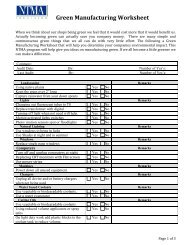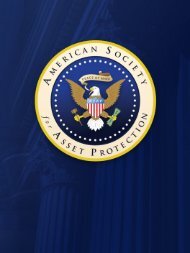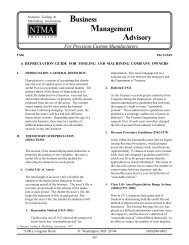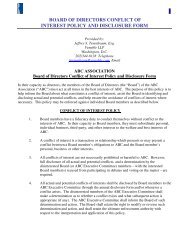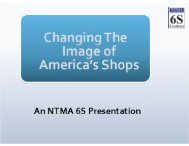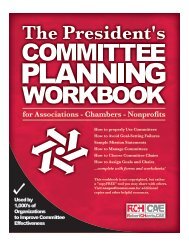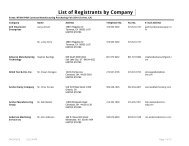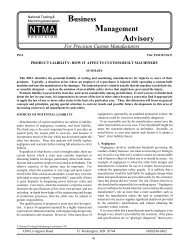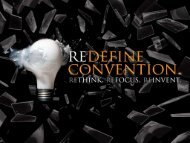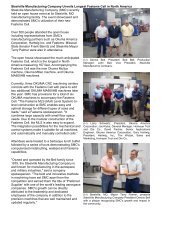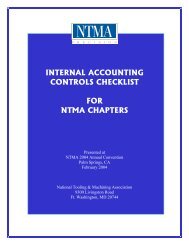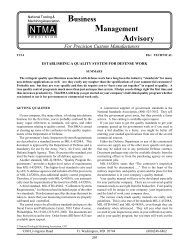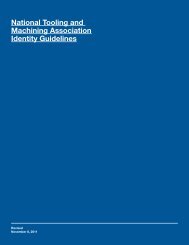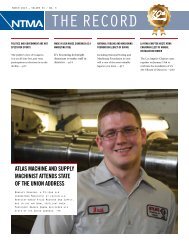Leasing Capitol Equipment - National Tooling and Machining ...
Leasing Capitol Equipment - National Tooling and Machining ...
Leasing Capitol Equipment - National Tooling and Machining ...
Create successful ePaper yourself
Turn your PDF publications into a flip-book with our unique Google optimized e-Paper software.
<strong>National</strong> <strong>Tooling</strong> &<br />
<strong>Machining</strong> Association<br />
NTMA<br />
P R E C I S I O N<br />
Business<br />
Management<br />
Advisory<br />
For Precision Custom Manufacturers<br />
PL08<br />
File: PLANNING<br />
LEASING CAPITAL EQUIPMENT<br />
SUMMARY<br />
<strong>Leasing</strong> represents an alternative to the outright purchase of capital equipment. Under the right circumstances,<br />
leasing offers many advantages over purchasing equipment, particularly for the small contract tooling <strong>and</strong> machining<br />
company.<br />
Profits are generated by the use of equipment <strong>and</strong> not by mere ownership. <strong>Leasing</strong>, therefore, can provide financial<br />
<strong>and</strong> tax advantages.<br />
<strong>Leasing</strong> can be used to acquire any type of capital equipment, including machine tools, vehicles <strong>and</strong> computers. A wide<br />
variety of leasing plans are available from various sources. This BMA will discuss some of the more popular types of<br />
leases currently in use <strong>and</strong> describe some of the advantages <strong>and</strong> pitfalls of leasing.<br />
WHY LEASE<br />
There are many advantages to leasing over purchasing.<br />
The primary advantage to most is the low initial cash outlay<br />
<strong>and</strong> the increased cash flow. Typically, leasing requires only<br />
a payment or two in advance. Many other forms of financing<br />
will require a down payment of 10% or more. In most states<br />
a lease can be structured such that the sales tax is paid over<br />
the term of the lease in the form of use tax. A down payment<br />
<strong>and</strong> sales tax can easily top 18% of the purchase price. This<br />
is 18% you do not need to pay up-front with a lease.<br />
<strong>Leasing</strong> Can Be Used To Help Improve Cash Flow<br />
By utilizing a residual value or purchase option at the end<br />
of the lease your monthly payments can be minimized. A<br />
lease can be structured so the lessor owns the equipment <strong>and</strong><br />
depreciates the equipment for tax purposes. These "tax<br />
benefits" are passed on to you, the lessee, through a lower<br />
monthly payment. Typically the lessee can also expense the<br />
payment for this type of lease. In cyclical businesses a lessee's<br />
payments can be structured to better match their seasonal<br />
cash flows, such as, quarterly payments, uneven payments,<br />
skip payments, etc.<br />
<strong>Leasing</strong> Can Be Used To Minimize Your Tax<br />
Consequences<br />
A true lease will help avoid Alternative Minimum Tax<br />
(AMT). The leasing company, or lessor, owns the equipment.<br />
Therefore, the lessee avoids Depreciation Preference associated<br />
with AMT. The company still gets the benefits of<br />
depreciation in the form of the "tax benefits" being passed on<br />
to them by the lessor through lower lease payments. <strong>Leasing</strong><br />
will also help avoid Mid-Quarter Convention. If the lease is<br />
structured as a true lease, the Mid-Quarter convention concerns<br />
are eliminated. A Sale/Leaseback can possibly help a<br />
company to get out of AMT or Mid-Quarter Convention if they<br />
have already gotten into these situations.<br />
A Lease Can Be Used As A Hedge Against Obsolescence<br />
If the lease is structured with a purchase option at termination,<br />
the equipment can be returned to the lessor at the end of<br />
the lease. This will work to the lessee's advantage if the<br />
payments are significantly lower than they would be in a full<br />
payout lease or loan. In this case the lessee is able to use the<br />
equipment for the lower payment. At the end of the lease they<br />
can return the equipment <strong>and</strong> upgrade to the latest <strong>and</strong><br />
greatest without the consequences of disposition or write off.<br />
These leases can be structured with a fixed early purchase<br />
option to protect the lessee against having to pay too much for<br />
the equipment if it turns out not to be obsolete at the end of the<br />
lease term. This same structure can be used if the equipment<br />
is being acquired for a specific contract. If a company has a<br />
three-year contract to produce parts on a special machine, they<br />
may want to go with a three-year lease. The lessee can<br />
increase cash-flow <strong>and</strong> profitability through the lower lease<br />
payments for the three years. If at the end of the three years<br />
the contract is not renewed <strong>and</strong> the lessee no longer needs the<br />
© <strong>National</strong> <strong>Tooling</strong> & <strong>Machining</strong> Association, 1997<br />
9300 Livingston Road Ft. Washington, MD 20744 (800)248-6862<br />
207
machine, they can simply return it to the lessor. If they extend<br />
the contract, the lessee can negotiate a renewal with the<br />
lessor.<br />
Increase Or Protect Your Borrowing Capacity<br />
All lending institutions will have a level of comfort with a<br />
given customer. By tying up these bank lines with equipment,<br />
a company can limit their borrowing capacity for working<br />
capital, etc. By going with a lease, a company protects itself<br />
from over utilizing their bank lines <strong>and</strong> finding themselves<br />
without borrowing capacity.<br />
DEAL WITH AN ESTABLISHED, REPUTABLE<br />
LEASING COMPANY<br />
Common sense Yes, but it is more than that. When you<br />
are arranging a lease, you are, in effect, using someone else's<br />
money to acquire the equipment you want. Who you deal with<br />
in this situation is all important. Make sure your leasing<br />
source has the experience, financial strength <strong>and</strong> resources to<br />
meet all your needs--short term <strong>and</strong> long term. It also helps<br />
if your leasing source has specific knowledge of your industry.<br />
<strong>Leasing</strong> <strong>and</strong> finance companies There are all types <strong>and</strong><br />
you should carefully investigate each source you are considering<br />
before you sit down to talk business. Find out how long<br />
they have been in business, how large their assets are, get the<br />
names <strong>and</strong> phone numbers of some of their current clients <strong>and</strong><br />
find out how satisfied or dissatisfied they are with the service<br />
they have received. Watch out, too, for leasing companies<br />
that deal in only one br<strong>and</strong> of equipment. They will limit your<br />
options.<br />
KNOW THE DIFFERENCES BETWEEN VARIOUS<br />
TYPES OF LEASES<br />
Do not assume that every lease will be "off balance sheet"<br />
. . . or that all lease payments are tax deductible. Some lease<br />
payments are tax deductible, but some are not. Before you<br />
commit to anything, discuss the lease terms with your tax<br />
accountant to make sure you are getting what you need. Many<br />
different types of leases are available: operating leases,<br />
capital leases, dollar option leases, fair market value leases,<br />
early buyout leases <strong>and</strong> more. Compare the various types of<br />
leases on a "total-cost" basis, including your monthly payments,<br />
residual payments, tax benefits, <strong>and</strong> protection against<br />
Alternative Minimum Tax (AMT) liability. Plus, you also<br />
need to underst<strong>and</strong> how financial ratios <strong>and</strong> bank covenants<br />
will impact you. It takes a little work on your part, but it is<br />
well worth the effort in potential savings. Find out how much<br />
you will be penalized for early termination. Many leases are<br />
written so that there is no advantage (to you) for early payoff.<br />
In fact, there may be a substantial penalty. You could get<br />
stuck with a piece of equipment you do not need or cannot use,<br />
because you are committed to a long-term lease obligation<br />
with no flexibility. Worse, it could even cost you more to get<br />
out of a lease early, than to continue paying your monthly<br />
obligation. Always be sure to read <strong>and</strong> underst<strong>and</strong> your lease.<br />
If you feel you may want to end the lease early, be sure to ask<br />
for a lease with an early purchase option alternative.<br />
DON'T BE FOOLED BY LOW-PAYMENT LEASES<br />
WITH HIGH PURCHASE OPTIONS<br />
Watch out for very high purchase options. Often, purchase<br />
options are set artificially high, in order to lower your<br />
monthly payments. Lower monthly payments may seem like<br />
a good deal, but if your lease requires a guarantee of an<br />
unrealistic purchase price, you may end up paying more for<br />
the equipment than it is worth at the end of the lease. You may<br />
want to consider a Fair Market Value purchase option which<br />
allows you to purchase the equipment at the end of the lease<br />
for an amount determined to be the value of the equipment on<br />
the open market at the time the lease expires. There are also<br />
leases available that offer a fair market value purchase option<br />
when the lease expires <strong>and</strong> a one time fixed price purchase<br />
option during the term. Reputable leasing companies will<br />
always fully disclose all purchase option requirements.<br />
FIND A LESSOR WHO UNDERSTANDS YOUR<br />
BUSINESS<br />
Some lessors have no idea of the nature of the business you<br />
are in. Other lessors may only have "canned" lease plans that<br />
make no allowance for the special terms you need. Find a<br />
lessor who underst<strong>and</strong>s the business, who knows the equipment,<br />
<strong>and</strong> can respond with an appropriate lease structure.<br />
Take comm<strong>and</strong> of the situation <strong>and</strong> do not be afraid to ask for<br />
special terms you may need --skip payments, monthly or<br />
quarterly payments, accelerated payments, etc.<br />
LOOK FOR AND UNDERSTAND TAX<br />
INDEMNIFICATION CLAUSES<br />
If your lessor is using the tax benefits of equipment<br />
ownership, the lease contract should include a "Tax Indemnification<br />
Clause." This clause may require you to reimburse<br />
the lessor for changes beyond the lessor's control-- for example:<br />
if there is a tax increase, or if you do something to<br />
disturb those tax benefits. Most lessors include this clause in<br />
some form, but these clauses may differ substantially. Make<br />
sure you underst<strong>and</strong> this clause so you will have no surprises.<br />
ALWAYS CONSULT YOUR ACCOUNTANT OR<br />
TAX ADVISOR BEFORE YOU SIGN A LEASE<br />
<strong>Leasing</strong> can provide powerful, money-saving tax advantages.<br />
Depending on your situation <strong>and</strong> the type of lease you<br />
arrange, your entire lease payment could qualify as an<br />
expense. The key work is could. Current tax laws are such<br />
that, today, the very same type of lease may qualify as a tax<br />
lease for one company but not for another. The reason No<br />
two companies have exactly the same tax structure <strong>and</strong><br />
liability. To be sure your lease payments may be expensed,<br />
always consult your accountant or tax advisor before you<br />
sign your lease.<br />
208
QUESTIONS YOU SHOULD ASK YOURSELF<br />
WHEN CONSIDERING A LEASE<br />
• Is the machine for a short term job, with little application<br />
for future use<br />
• Is it a replacement machine that is essential to the<br />
business<br />
• Is it a machine that you have immediate need for, but<br />
a moderate need for in the future<br />
• Is cash flow a major concern<br />
• Is there cash available to purchase the machine<br />
• Is there adequate availability for financing under<br />
current Bank Lines<br />
• Will this purchase affect finance ratios<br />
• Will this purchase affect bank convenants<br />
• Can the depreciation be fully utilized<br />
• Will this purchase trigger an Alternative Minimum<br />
Tax<br />
• Will this purchase trigger Mid-Quarter Convention<br />
• Will this purchase trigger a Capital Gain<br />
COMMON LEASE TERMINOLOGY<br />
Lessor<br />
Usually the owner of the equipment being leased. The<br />
finance company who purchases the equipment, in order to<br />
lease it to an end user for a fee.<br />
Lessee<br />
User of the leased equipment. A lessee will lease/rent a<br />
piece of equipment from the lessor in order to utilize the<br />
equipment. The lessee pays the lessor a fee for using the<br />
equipment in the form of rent.<br />
Operating Lease<br />
This is an accounting term for a fixed-term lease wherein<br />
the lessee acquires the use of an asset, for a portion of the<br />
assets useful life. Generally, lease payments are expensed<br />
<strong>and</strong>, accordingly, the lease transaction is not reflected on the<br />
balance sheet.<br />
Capital Lease<br />
This is an accounting term for a lease which includes<br />
among its characteristics, a bargain purchase option or an<br />
initial term equal to 75% or more of the useful life of an asset<br />
or which has a present value of lease payments equal to 90%<br />
or more of the equipment cost. Generally, this lease is<br />
capitalized on the balance sheet.<br />
Dollar Option Lease (Bargain Purchase Option)<br />
Allows the Lessee to purchase the asset at the end of the<br />
lease term for a nominal or bargain amount, usually one<br />
dollar. These types of leases are always capital leases (see<br />
above).<br />
Fair Market Value Lease<br />
Allows a lessee to purchase the asset at the end of the lease<br />
for an amount determined to be the value of the asset on the<br />
open market at the time the lease expires. This is called the<br />
Fair Market Value Purchase Option.<br />
Tax Lease<br />
A lease that qualifies, by meeting certain IRS guidelines, to<br />
have lease payments treated as an expenses for Income Tax<br />
purposes.<br />
Early Purchase Option<br />
A one time, fixed price purchase option offered at a specific<br />
date during the lease term <strong>and</strong> estimated to be equal to the Fair<br />
Market Value of the equipment at the Early Purchase Option<br />
date.<br />
This BMA was prepared by Michael J.<br />
Fitzsimmons, <strong>National</strong> Marketing Manager of<br />
Associates Commercial Corporation, Irving,<br />
Texas.<br />
209



